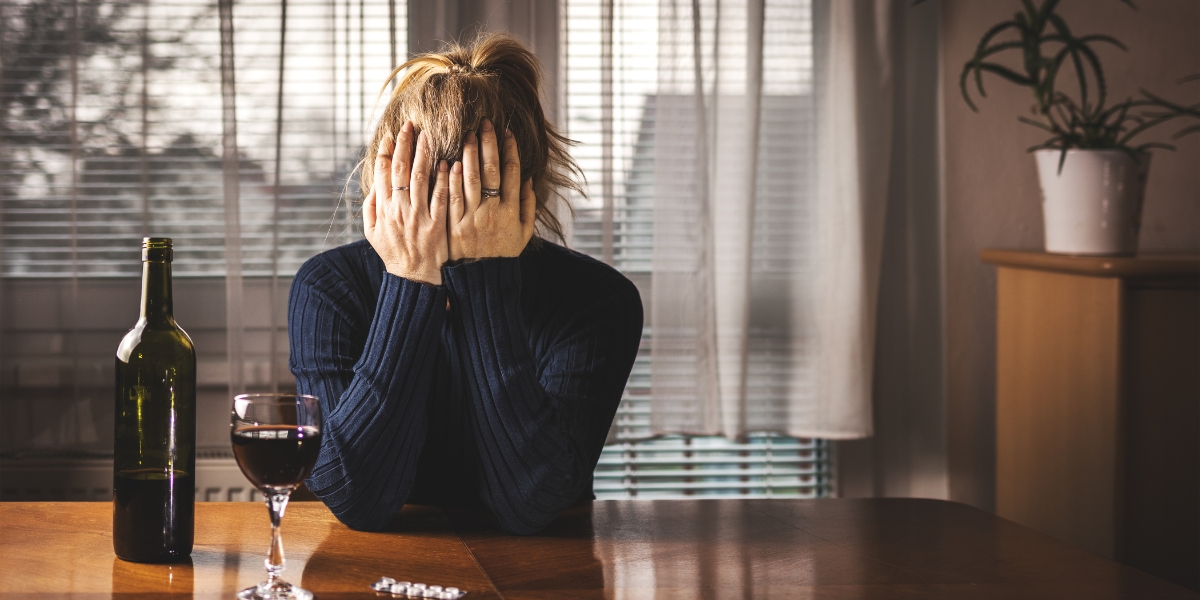Mixing Alcohol and Antidepressants: The Dangers
Alcoholism

Many people with depression and anxiety use alcohol to self-medicate and feel good. The unfortunate truth is that alcohol increases depression and despair, leading to a vicious cycle of worsening symptoms of depression and abusing alcohol to escape.
If people seek professional help and take antidepressants, many find it challenging to give up their alcohol dependence. Studies have shown that people on antidepressants have a reduced desire to drink once their symptoms are controlled.
However, it is not as simple as quitting for people with substance use disorders. Finding a treatment facility that addresses co-occurring disorders like alcohol abuse and mental health conditions can avoid the dangerous outcomes of mixing alcohol and antidepressants.
Can You Drink Alcohol While Taking Antidepressants?
Having the physical and legal capability to do something does not mean it is a good or safe idea, like drinking alcohol while taking antidepressants.
The National Alliance on Mental Illness (NAMI) cautions that the risks of combining alcohol and antidepressants outweigh any potential feel-good benefits in most cases. Even if a medication doesn’t have direct adverse effects when combined with alcohol, the combination can still worsen symptoms of depression and increase self-destructive thoughts and behaviors.
Some doctors may allow moderate drinking, one drink for women or two for men after your body acclimates to taking antidepressants. You should always seek medical advice before you decide to drink while taking antidepressants.
How Does Alcohol Interact with the Different Types of Antidepressants?
To understand how alcohol interacts with different types of antidepressants, you must understand the different classes of antidepressants and the basics of how they work.
Antidepressants work with neurotransmitters in the brain to produce specific chemicals or alter how the brain and nervous system process and react to signals and chemicals. When alcohol enters the equation, it can change the effectiveness of antidepressants, magnify their side effects, and sometimes it can cause dangerous interactions.
The following are the most common types of antidepressants, a brief description of what they do, and how alcohol interacts with them:
Selective Serotonin Reuptake Inhibitors (SSRIs)
SSRIs treat depression, anxiety, and obsessive-compulsive disorder. SSRIs slow down how quickly the brain absorbs serotonin. More serotonin staying in the system reduces depressive side effects. Alcohol can slow down the metabolization of SSRIs and reduce their effectiveness; it also increases the drowsy feelings that are a side effect of this antidepressant.
Serotonin and Norepinephrine Reuptake Inhibitors (SNRIs)
SNRIs work the same way as SSRIs but also affects norepinephrine absorption. Norepinephrine increases focus and attention and the ability to create new memories and accurately recall old ones. Alcohol diminishes the effectiveness of SNRIs and can cause feelings of confusion, disconnectedness, lapses in memory, and liver damage.
Tricyclic Antidepressants (TCAs)
TCAs slow the absorption of multiple chemicals associated with depression when absorbed too quickly. TCAs break down in the liver, have a strong sedative effect, and cause clumsiness. Alcohol amplifies the drowsy feelings TCAs cause and further slows down reflexes and motor skills. Alcohol prevents the liver from fully processing TCAs, causing them to be more active in the system. High levels of TCAs increase the risk of convulsions, seizures, heart palpitations, and liver damage.
Monoamine-oxidase inhibitors (MAOIs)
MAOIs treat depression and Parkinson’s disease by altering the way enzymes break down and process a variety of chemicals associated with both illnesses. Furthermore, MAOIs cause sensitivity to a chemical called tyramine, found in some foods, beers, and wine, specifically red wines. Reactions to tyramine cause sudden, dangerous spikes in blood pressure and an increased risk of stroke.
Other medications and antidepressants, called atypical antidepressants, work in different ways or are used off-label to treat migraines, nerve pain, and autoimmune diseases like fibromyalgia. Combining these with alcohol can cause increased sedation or flair-ups of the conditions they are supposed to help.

Side Effects of Combining Alcohol and Antidepressants
The side effects of combining alcohol and antidepressants will differ based on the type of antidepressant, the dosage, how much you consume, biological factors, and co-occurring health conditions.
Common side effects of alcohol and antidepressants include:
- Drowsiness
- Becoming impaired after a small amount of alcohol
- Dizziness
- High blood pressure
- Loss of motor functions
- Increase in blood pressure
- Worsening depression and anxiety
- Seizures
- Nausea
- Vomiting
- Heart palpitations
- Kidney damage
- Liver damage
- Alcohol use disorder
Call 911 immediately if side effects are overwhelming or a person becomes a danger to themselves or others.
What Are the Dangers of Mixing Antidepressants and Alcohol?
Mixing antidepressants and alcohol increases the risk of injury or death from external causes due to how the combination affects thoughts, feelings, and actions. Below are some of the dangers of mixing antidepressants and alcohol.
- Injuries from falling or losing coordination
- Skipping doses of antidepressants to continue drinking with fewer side effects
- Accidents or injuries while driving or operating machinery
- Reduced inhibition leads to poor judgment and dangerous actions and situations
- Suicidal thoughts, behaviors, or attempts
Depression distorts perceptions of realities and risks, and alcohol can cause impulsive actions and bad judgment; combined, they can produce tragic results.
How Much Alcohol Can You Drink While on Antidepressants?
Some people are unwilling to stop drinking for various reasons, including alcohol use disorders, which are chronic conditions. It is ideal to wait until your body has adjusted to antidepressants and you are familiar with the side effects and how they make you feel before introducing alcohol to your system again.
One drink a day for women or two for men is considered moderate drinking and relatively safe while on some antidepressants. Even if you want to drink socially, seeking medical advice and planning for unexpected side effects or reactions is always a good idea.
Binge drinking, heavy drinking, and constant drinking are never good ideas, especially with antidepressants.
Are There Alcohol Safe Antidepressants?
No antidepressant is 100% safe to combine with alcohol.
Some are less dangerous to drink on, but there is no guarantee you won’t react negatively.
Treatment facilities with specialized therapy and treatment programs are available if you cannot stop drinking because of substance abuse issues or fear of alcohol withdrawal.

Can You Die From Mixing Antidepressants and Alcohol?
Dying from mixing antidepressants and alcohol is rare, but it is possible. The sedative effects of the combination of alcohol and antidepressants can lead to fatal accidents. The loss of coordination and slow reaction time causes falls, vehicle accidents, and other unintentional injuries that may be life-threatening.
Increased feelings of hopelessness and depression also cause recklessness and suicidal thoughts and feelings; without support, the resulting actions can be deadly.
Alcohol Use Disorder Treatment
At Northridge Addiction Treatment Center, we understand how essential addressing a mental health disorder is to maintaining recovery. We also understand how difficult overcoming an alcohol use disorder can seem.
We provide onsite medical detox to safely get you through alcohol withdrawal and address any complications caused by antidepressants and other substances.
We specialize in treating co-occurring disorders with evidence-based treatments that equip you with the knowledge, skills, and confidence to overcome future challenges without resorting to substance abuse.
Reach out today. We are eager to help you start on the path to recovery.
Find Meaningful Recovery
Our caring and compassionate specialists are eager to help you comfortably navigate this journey to recovery. Our individualized treatment plan, programs, and therapies may be a perfect match for you or your loved one. Let us assist you in living the happy life you deserve. It starts with a phone call.




